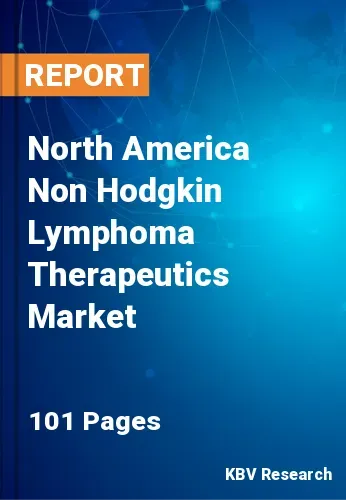The North America Non Hodgkin Lymphoma Therapeutics Market would witness market growth of 7.8% CAGR during the forecast period (2023-2030).
Traditional chemotherapeutic agents, such as cyclophosphamide, doxorubicin, vincristine, and prednisone (CHOP), are commonly used to induce remission in NHL. These agents target rapidly dividing cells and aim to eliminate cancerous lymphocytes. Agents like rituximab, a monoclonal antibody targeting the CD20 antigen on B-cells, have been widely combined with chemotherapy to enhance treatment responses and improve remission rates. Emerging targeted therapies, such as BTK inhibitors (e.g., ibrutinib) and PI3K inhibitors (e.g., idelalisib), are increasingly employed in first line and relapsed/refractory settings to induce remission and extend progression-free survival.
Monoclonal antibodies, including rituximab, can be utilized as maintenance therapy following induction to prolong remission. This approach is particularly relevant in certain subtypes of NHL, contributing to sustained disease control. Novel agents like BTK inhibitors may be used in a maintenance capacity to prevent disease relapse, especially in patients with chronic lymphocytic leukemia (CLL) or mantle cell lymphoma (MCL). Chimeric Antigen Receptor T-cell (CAR-T) therapies, such as axicabtagene ciloleucel and tisagenlecleucel, have shown remarkable efficacy in treating relapsed or refractory NHL. These therapies involve engineering a patient's T-cells to recognize and eliminate cancer cells.
National and regional cancer registries in Mexico collect and analyze data on cancer cases, including NHL. Improved access to healthcare services, diagnostic tools, and medical expertise can lead to better detection and reporting of cancer cases, contributing to the perception of cancer growth in Mexico. Increased awareness of cancer symptoms and the implementation of cancer screening programs can lead to earlier detection and diagnosis of NHL cases in Mexico. As per the National Library of Medicine, NHL is the ninth leading cause of cancer in Mexico, accounting for 3.1% of all cancers. Hence, the factors mentioned above will drive the regional market growth.
The US market dominated the North America Non Hodgkin Lymphoma Therapeutics Market by Country in 2022, and would continue to be a dominant market till 2030; thereby, achieving a market value of $4,768.5 Million by 2030. The Canada market is registering a CAGR of 10.2% during (2023 - 2030). Additionally, The Mexico market would showcase a CAGR of 9.3% during (2023 - 2030).
Free Valuable Insights: The Non Hodgkin Lymphoma Therapeutics Market is Predict to reach $16.8 Billion by 2030, at a CAGR of 8.4%
Based on Cell Type, the market is segmented into B-Cell Lymphoma and T-Cell Lymphoma. Based on Therapy Type, the market is segmented into Radiation Therapy, Chemotherapy, Targeted Therapy, and Others. Based on countries, the market is segmented into U.S., Mexico, Canada, and Rest of North America.

By Cell Type
By Therapy Type
By Country
Our team of dedicated experts can provide you with attractive expansion opportunities for your business.

